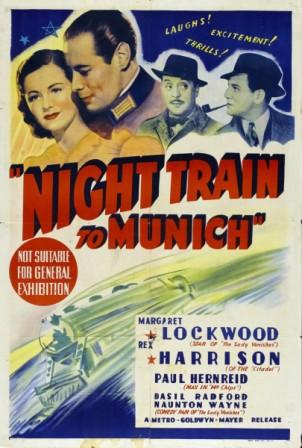“It’s a pity [nature] didn’t endow you with a voice. Nothing that happened to me in the concentration camp was quite as dreadful as listening to you day after day singing those appalling songs.” — Anna to Gus Bennett
September 3, 1939. The Berghof, Adolf Hitler’s Alpine retreat. A man, clearly the madman himself—the aggressive music, the uncontrolled shouting, the swastika armband—stands in the great hall, with its famous retractable picture window. He pounds a fist on a map of Austria on the large table. It’s that country he wants. Newsreel footage of invading, stiff-legged Nazi troops and war machines.
Then, again, the pounding fist, the shouting, the unattractive music, only now it’s a map of the Sudetenland. That part of Europe, too, the madman wants—and gets. More invading troops. Next,Prague, and next . . .
England was well into the Battle of Britain by the time of the U.K. release, in August of 1940, of Night Train to Munich, the U.S. release coming the following December, a whole year before Pearl Harbor.
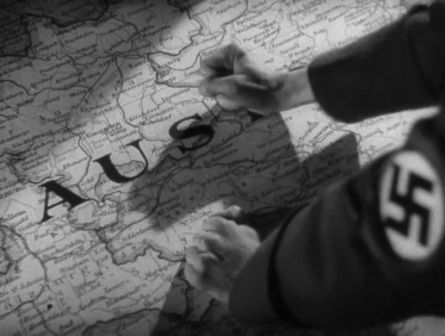 At this point in the two major stars’ careers, Margaret Lockwood was better known than her co-star Rex Harrison, thus her top billing above him. She would remain popular until the 1950s. Beginning with Night Train, Harrison’s career would continue to grow with Blithe Spirit (1945), Anna and the King of Siam (1946) and The Ghost and Mrs. Muir (1947), and later, whether the films were catastrophes, great or indifferent, he would reach the heights with Cleopatra (1963), My Fair Lady(1964) and The Agony and the Ecstasy (1965).
At this point in the two major stars’ careers, Margaret Lockwood was better known than her co-star Rex Harrison, thus her top billing above him. She would remain popular until the 1950s. Beginning with Night Train, Harrison’s career would continue to grow with Blithe Spirit (1945), Anna and the King of Siam (1946) and The Ghost and Mrs. Muir (1947), and later, whether the films were catastrophes, great or indifferent, he would reach the heights with Cleopatra (1963), My Fair Lady(1964) and The Agony and the Ecstasy (1965).
Speaking of this last film, the story of the strained relationship between painter Michelangelo and Pope Julius II over the Sistine Chapel, its director Carol Reed also gave Night Train to Munich its style and pace, a rewarding blend of espionage thriller, light romance and contrasting humor.
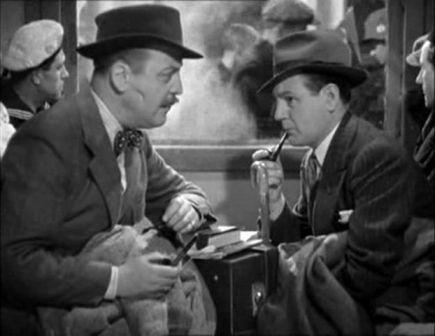 The humor comes mainly from the second screen airing of the two cricket-loving Englishmen abroad, twits who constantly grumble when their limited interests and travel are inconvenienced by the intruding real world, in this case, in 1939, a world on the brink of war. Charters (Basil Radford) and Caldicott (Naunton Wayne) were delightfully introduced in Alfred Hitchcock’s The Lady Vanishes(1938), creations of screenwriters Sidney Gilliat and Frank Launder, who also share the same literary credit in Night Train. In the Hitch film, they are introduced in the beginning; here they enter at the film’s midpoint. The pair would appear in two subsequent films, Crook’s Tour (1941) and Millions Like Us (1943).
The humor comes mainly from the second screen airing of the two cricket-loving Englishmen abroad, twits who constantly grumble when their limited interests and travel are inconvenienced by the intruding real world, in this case, in 1939, a world on the brink of war. Charters (Basil Radford) and Caldicott (Naunton Wayne) were delightfully introduced in Alfred Hitchcock’s The Lady Vanishes(1938), creations of screenwriters Sidney Gilliat and Frank Launder, who also share the same literary credit in Night Train. In the Hitch film, they are introduced in the beginning; here they enter at the film’s midpoint. The pair would appear in two subsequent films, Crook’s Tour (1941) and Millions Like Us (1943).
When the Nazis invade Prague, Axel Bomasch (James Harcourt), who works for the Allied defense industry, tries to flee to England. His daughter, Anna (Lockwood), is captured and placed in a concentration camp. Even the little she knows of her father’s work she refuses to divulge, and is befriended by an anti-Nazi prisoner, Karl Marsen (Paul Henreid).
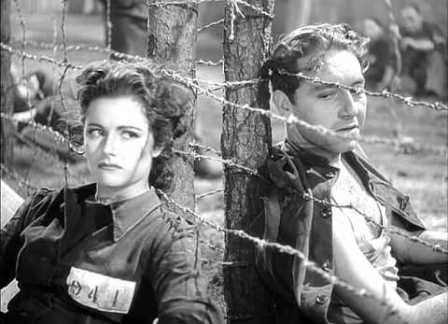 Together, they escape to London, but in a hush-hush meeting with a contact (Felix Alymer, the Archbishop of Canterbury in Olivier’s Henry V, 1944) Karl is revealed to be a Gestapo agent who hopes Anna will lead him to her father.
Together, they escape to London, but in a hush-hush meeting with a contact (Felix Alymer, the Archbishop of Canterbury in Olivier’s Henry V, 1944) Karl is revealed to be a Gestapo agent who hopes Anna will lead him to her father.
In England, Anna receives an enigmatic phone call to meet a man named Gus Bennett in Brightbourne. Not telling Karl, though she is followed, she meets Gus (Harrison), a cocky British intelligence officer masquerading as a seaside singer. She is reunited with her father, but resents Gus’ constraints on her father’s security.
Anna and Gus quarrel over Karl. Anna wants to contact him, but Gus is suspicious of the man. Gus proves right when Anna and her father are kidnapped, and Karl threatens the concentration camp unless Axel agrees to work for the Nazis.
As Karl posed as someone else, so Gus now infiltrates the German high command as an engineer, Major Ulrich Herzog. In a ruse to deceive the controller (Kenneth Kent) and an admiral (C.V. France), he implies he has had a past affair with Anna and thus can persuade her to win her father’s cooperation. After Gus and Anna have spent the night in a hotel, a jealous Karl foils Gus’ planned escape and escorts the pair on a train bound for Munich.
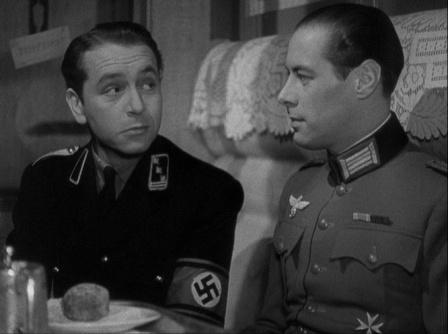
At the station the two Englishmen, Caldicott and Charters, recognize Gus, an old school chum they knew as “Dickie” Randall. At first unsure it is “Dickie” in the Nazi uniform, they overhear on an extension phone Karl conversing with the Nazis and realize that Gus is an undercover British agent—and now in danger, his real identity revealed.
Caldicott and Charters, who have stowed away on the train, warn Gus of the danger and help tie up Karl and two guards. With the two Englishmen disguised as Nazi soldiers, the five, now including Alex, escape by car, only to be chased to the Swiss border by Karl and his cohorts, and flee to an aerial tram station. While Anna and the others flee in one tram across a valley to Switzerland, Gus holds off Karl and his gang until the companion tram arrives. After a gunfight and Gus’ heroic jump, mid-air, to a Swiss-bound tramp, a wounded Karl is unable to reach the winch to return the tram, and can only watch as Anna and Gus embrace in a safe, Nazi-free country.
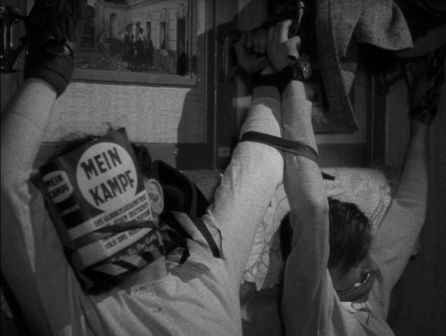
Night Train is a well made spy caper, deftly paced and beautifully photographed by Otto Kanturek, who was later killed when a Hurricane fighter collided with his camera plane during the filming of A Yank in the R.A.F. (1941). Leon Shamroy, his successor, was given screen credit.
Margaret Lockwood, though attractive and competent in her role, is no longer the central interest she is in The Lady Vanishes, an emphasis assumed now by Rex Harrison. Always impressive in a uniform, even a Nazi one, he is convincing in the part, if sometimes he could slow down a little, though he is adhering to the tempo of the film. For a distinct contrast, and a more nuanced performance, he plays the charismatic dead sea captain, who comes to love Gene Tierney, and she him, in The Ghost and Mrs. Muir (1947).
When disguised as an anti-Nazi damning his concentration camp interrogators, Paul Henreid is more fervent, however falsely so, than he is as the dull Victor Laszlo, the Czech underground leader, in Casablanca (1942). Strangely, Karl isn’t all that unlikable a villain; perhaps the screenwriters felt the same way, since they allow him to live in the end.
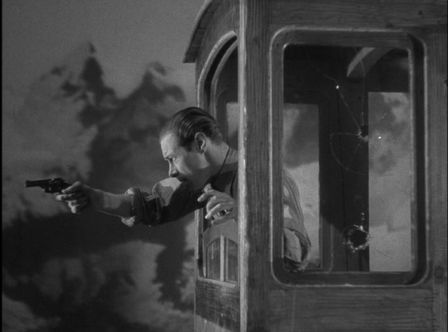 The humor provided by Basil Radford and Naunton Wayne is much more subdued than their previous appearance, and their plot participation highly reduced, compared with their film-length contribution in The Lady Vanishes.
The humor provided by Basil Radford and Naunton Wayne is much more subdued than their previous appearance, and their plot participation highly reduced, compared with their film-length contribution in The Lady Vanishes.
Even if the train journey in Night Train to Munich is less than half the film and the characters in general are fewer and less interesting than in Hitchcock’s thriller, the entire trip is well worth it. For one thing, the Nazis, this early in the war, can still be seen, without too much guilt, as comic buffoons before their true bestiality is revealed in the concentration camps of Auschwitz and Treblinka.
[embedyt] https://www.youtube.com/watch?v=2UN-75wzaAU[/embedyt]
